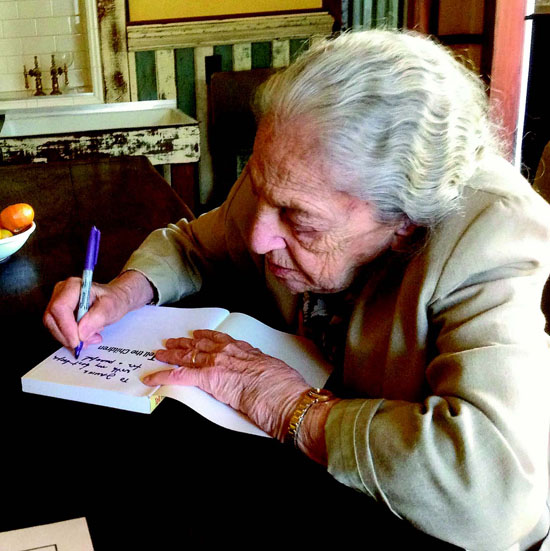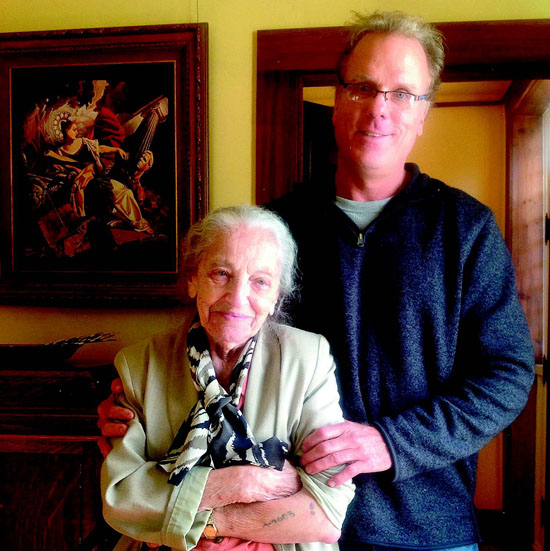 |
|
|
Sorell autographing a copy of her book, "Tell the Children, Letters to Miriam."
|
|
|
|
|
|
"When my first grandchild ... was born, it dawned on me that the new generation ... would grow up without knowing who we are and where we came from ... all that we suffered and lost during the Nazi era. Unless I told them." So begins Holocaust survivor and Berkeley resident Dora Sorell's fascinating and important memoir, "Tell the Children, Letters to Miriam." And tell them, she does. With graphic detail, Sorell writes letters to her granddaughter describing her life in the "old country."
 "They're vignettes, really," Sorell says. When memories would come to her, she would write a letter, tell a story. Sometimes it would be once a week, sometimes it would be twice a day. "Some were sad, others tragic," she writes in the book's preface, "yet many were funny or sweet, as life and memories usually are."
"They're vignettes, really," Sorell says. When memories would come to her, she would write a letter, tell a story. Sometimes it would be once a week, sometimes it would be twice a day. "Some were sad, others tragic," she writes in the book's preface, "yet many were funny or sweet, as life and memories usually are."
 Her letters were turned into a highly-rated book in 1998 and Sorell became a sought-after speaker. She estimates that she has told her story more than 600 times to thousands of people in the Bay Area and beyond. On Oct. 22, Sorell will again be telling her story, this time at the Orinda Library. It is, indeed, quite a tale and one not to be missed.
Her letters were turned into a highly-rated book in 1998 and Sorell became a sought-after speaker. She estimates that she has told her story more than 600 times to thousands of people in the Bay Area and beyond. On Oct. 22, Sorell will again be telling her story, this time at the Orinda Library. It is, indeed, quite a tale and one not to be missed.
 It is a heartbreaking story: in 1944, at age 22, Sorell, her parents, two brothers and 40 other family members were transported to Auschwitz. She was the only one in the family to escape the gas chamber.
It is a heartbreaking story: in 1944, at age 22, Sorell, her parents, two brothers and 40 other family members were transported to Auschwitz. She was the only one in the family to escape the gas chamber.
 Sorell survived first the concentration camp and then a forced labor camp. She survived hunger and beatings, fear and loneliness. Following her liberation and return to her hometown of Sighet, Romania, Sorell married her high school sweetheart, who had waited for her.
Sorell survived first the concentration camp and then a forced labor camp. She survived hunger and beatings, fear and loneliness. Following her liberation and return to her hometown of Sighet, Romania, Sorell married her high school sweetheart, who had waited for her.
 "He was one of the lucky ones," Sorell explains. "Instead of being sent to the concentration camp, he spent five years in jail for being a communist." They were married for 63 happy years before his death eight years ago.
"He was one of the lucky ones," Sorell explains. "Instead of being sent to the concentration camp, he spent five years in jail for being a communist." They were married for 63 happy years before his death eight years ago.
 It took Sorell 16 years and 10 visa applications before she and her family were finally able to leave communist Romania. During that time she graduated from medical school and began practicing medicine. After two years in Brazil, where two of her brothers lived, she and her family moved to the United States, first to New York, where another two brothers lived and where Sorell became a tenured professor of rehabilitative medicine, and 20 years ago, to California.
It took Sorell 16 years and 10 visa applications before she and her family were finally able to leave communist Romania. During that time she graduated from medical school and began practicing medicine. After two years in Brazil, where two of her brothers lived, she and her family moved to the United States, first to New York, where another two brothers lived and where Sorell became a tenured professor of rehabilitative medicine, and 20 years ago, to California.
 Sorell takes no money for her presentations, stating that she refuses to make money from such a tragedy. Over the years, any funds received are donated to charity. "When I see others suffering as I did ... I give it to them," she was quoted as saying in a San Francisco Chronicle article last year.
Sorell takes no money for her presentations, stating that she refuses to make money from such a tragedy. Over the years, any funds received are donated to charity. "When I see others suffering as I did ... I give it to them," she was quoted as saying in a San Francisco Chronicle article last year.
 Sorell raised three children and now has the joy of spending time with her eight grandchildren, and the determination to tell her story - one that Sorell believes needs to be shared "to impart that experience to young people and acquaint them with the dangers of hatred and intolerance.
Sorell raised three children and now has the joy of spending time with her eight grandchildren, and the determination to tell her story - one that Sorell believes needs to be shared "to impart that experience to young people and acquaint them with the dangers of hatred and intolerance.
 "Sensitizing the new generation to discrimination and suffering has become my mission," she writes.
"Sensitizing the new generation to discrimination and suffering has become my mission," she writes.
 Her book has a five-star rating on Amazon.com, with one reviewer writing that it is a "vivid story so well told," and another stating, "The Holocaust description is the most moving one I have ever read and preserves ... the realities of a terrible time through the eyes of a survivor." A natural-born storyteller, Sorell happily notes that she has lots of tales to tell. She tells them from a personal perspective. Audiences who have seen her presentations have called her entertaining, sweet, cute, humorous and even sassy.
Her book has a five-star rating on Amazon.com, with one reviewer writing that it is a "vivid story so well told," and another stating, "The Holocaust description is the most moving one I have ever read and preserves ... the realities of a terrible time through the eyes of a survivor." A natural-born storyteller, Sorell happily notes that she has lots of tales to tell. She tells them from a personal perspective. Audiences who have seen her presentations have called her entertaining, sweet, cute, humorous and even sassy.
 At 94 years of age, Sorell is experiencing health issues. Her hearing may not be what it once was and, as she notes, with humor, "When I forget what I was saying, I just say 'well, sure, I'm 94.'" But she calmly recalls hundreds of stories from the past, often beginning a sentence with "Let me tell you this story." And she hopes to be able to continue telling these stories.
At 94 years of age, Sorell is experiencing health issues. Her hearing may not be what it once was and, as she notes, with humor, "When I forget what I was saying, I just say 'well, sure, I'm 94.'" But she calmly recalls hundreds of stories from the past, often beginning a sentence with "Let me tell you this story." And she hopes to be able to continue telling these stories.
 "It's very important for people to know about the Holocaust and about the history of that time," she says. As she told an interviewer in 2000, she's going to talk about the Holocaust until she takes her last breath. It is her legacy to the future generation.
"It's very important for people to know about the Holocaust and about the history of that time," she says. As she told an interviewer in 2000, she's going to talk about the Holocaust until she takes her last breath. It is her legacy to the future generation.
 You can hear Sorell speak and see her many pictures at a free community event, sponsored by The Rotary Club of Orinda, at 7 p.m. Tuesday, Oct. 22 at the Orinda Library. Sorell will speak for an hour and then open the floor for questions. Copies of her book will also be available for purchase and signing.
You can hear Sorell speak and see her many pictures at a free community event, sponsored by The Rotary Club of Orinda, at 7 p.m. Tuesday, Oct. 22 at the Orinda Library. Sorell will speak for an hour and then open the floor for questions. Copies of her book will also be available for purchase and signing.


|

